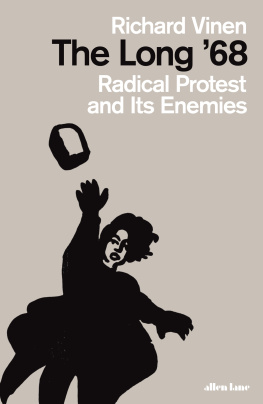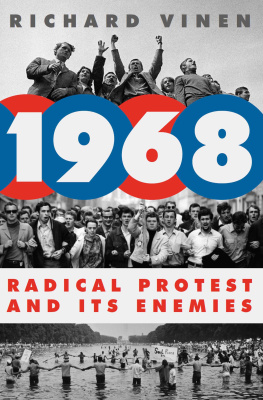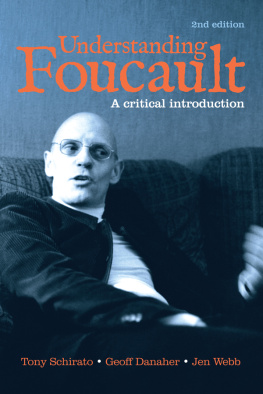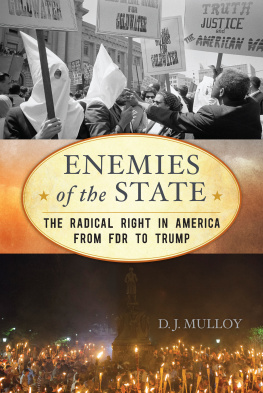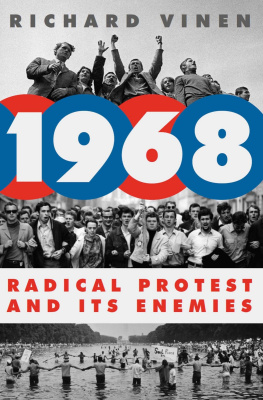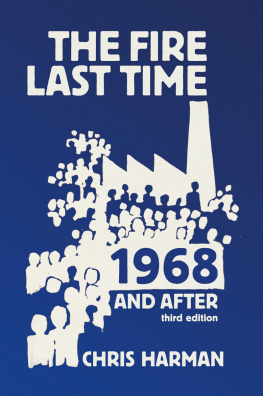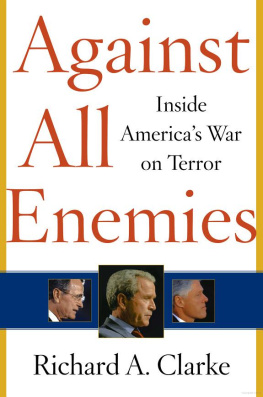Richard Vinen
THE LONG 68
Radical Protest and Its Enemies
ALLEN LANE
UK | USA | Canada | Ireland | Australia
India | New Zealand | South Africa
Allen Lane is part of the Penguin Random House group of companies whose addresses can be found at global.penguinrandomhouse.com.
First published in Great Britain 2018
Copyright Richard Vinen, 2018
The moral right of the author has been asserted
Cover: La beaut est dans la rue, Poster, 1968. Photograph by akg-images
ISBN: 978-0-141-98253-3
For Alex
List of Tables
. Working Days Lost in Strikes in France, in Thousands, 196870
. Working Days Lost in Strikes in France, in Thousands, 19641974
. Working Days Lost in Strikes per Thousand Employees, 19641974, in Selected Western Countries
List of Chronologies
. The Short 68: The May Events in France
. The Long 68: A Brief Chronology
Abbreviations
| BPP | Black Panther Party |
| CDU | Christlich Demokratische Union Deutschlands |
| CFDT | Confdration Franaise Dmocratique du Travail |
| CGT | Confdration Gnrale du Travail |
| CIA | Central Intelligence Agency |
| CSU | Christlich-Soziale Union in Bayern |
| FBI | Federal Bureau of Investigation |
| FO | Force Ouvrire |
| IMG | International Marxist Group |
| IRA | Irish Republican Army |
| IS | International Socialists |
| JCR | Jeunesse Communiste Rvolutionnaire |
| NATO | North Atlantic Treaty Organization |
| NUM | National Union of Mineworkers |
| PCF | Parti Communiste Franais |
| PSU | Parti Socialiste Unifi |
| RSA | Radical Student Alliance |
| RSSF | Revolutionary Socialist Students Federation |
| SDS (Germany) | Sozialistischer Deutscher Studentenbund |
| SDS (USA) | Students for a Democratic Society |
| SFIO | Section Franaise de lInternationale Ouvrire |
| SLL | Socialist Labour League |
| SNCC | Student Non-Violent Co-Ordinating Committee |
| SPD | Sozialdemokratische Partei Deutschlands |
| UJCML | Union des Jeunesses Communistes Marxistes-Lninistes |
Introduction
This book is about 68, by which I mean the radical movements and rebellion of the late 1960s and early 70s, rather than about the year 1968. 68 is both ubiquitous and remote. The songs of the era can be heard playing in the background at supermarkets, the slogans pop up in advertisements and yet the militants of the late 1960s and early 70s are now past retirement age: pensions are a frequent concern among those who spent years outside the conventional economic system. The veterans (a term that no longer seems as ironical as it once did) are painfully conscious of how the world has changed. Casting his 2012 film on 68, Aprs Mai, Olivier Assayas was struck by the fact that young actors were more interested in the clothes than the politics. Those undergoing his screen tests were mainly united by a common enthusiasm for hair gel.
Whole mountain ranges have disappeared from the political landscape. The image of Chairman Mao is now mainly diffused on banknotes. The collapse of the Soviet Union was an earthquake for orthodox Communists but also for the Trotskyist factions that distinguished themselves from each other by the different grounds on which they denounced the USSR. The kind of working class that once interested parts of the student left has changed beyond recognition. Daniel Rondeau, revisiting his Maoist past in the 1980s, met an old friend who said that returning to Paris in the mid-1970s, after their political group had dissolved itself, felt like coming to a museum. Rondeau himself went back to Lorraine, the industrial area in which he had gone to work as a political missionary in the early 1970s, but it was unrecognizable. The factories had all been dynamited. Anyone visiting the University of Kent near Canterbury in England will still see a university of the 1960s, complete with a college named after Keynes, but who now would believe that there were once coal mines in the English home counties and that the Kent miners were particularly radical in the strikes of the early 1970s?
Sometimes the period from the mid-1960s to the late 1970s seems like a dream, or nightmare, from which the participants eventually woke up. Eleanor Stein was born in 1946. She was the daughter of Communists and her parents were under FBI surveillance from the early 1940s, but the style of her early life was relatively conventional. When she married Jonah Raskin in 1964, he wore a suit and the couple twisted on the dance floor as the band mangled a Beatles song. Five years later, Eleanor was photographed with an Afro haircut giving a clenched fist salute. Five years further on, Jonah Raskin did not even know where his wife was. Their marriage had been pulled apart by the cross currents of sexual and political liberation. She was on the run with the Weather Underground holed up in New York apartments, living on rice and a Vietnamese fish sauce that radicals affected to like. She had an affair with Jeff Jones but broke up with him and gave birth to their son Thai named after a Viet-cong leader on her own. However, by the time the FBI tracked them down in 1981, Jeff Jones and Eleanor were back together living under false names but raising their child in the way that a young couple of fifteen years earlier might have regarded as normal. When Eleanor got out of prison, she went back to law school and became an adjunct judge specializing in administrative law.
This book is an attempt to reconstruct the world that came and, largely, went in the late 1960s and early 70s. Defining 68 is difficult and the next chapter is devoted to the various ways in which one might do this. It would be useful, however, to begin with some simple points. First, I have distinguished between 1968, by which I mean a single eventful year, and 68 or the long 68, by which I mean the variety of movements that became associated with, and sometimes reached their climax in, 1968 but that cannot be understood with exclusive reference to that year. In chronological terms, I have not set precise frontiers. Most of my account concerns events in the late 1960s and early 70s but I have sometimes gone back further in time, especially with regard to America. As for when 68 ends, in the obvious sense that many who were most active in it are still alive, and that a small but significant minority of them reached the apogee of their influence around the end of the twentieth century, 68 goes on for several decades.
In at least one important respect, my approach may seem perverse, and indeed to run counter to my own emphasis on a long 68. I have been influenced by the work of French historians on what they refer to as les annes soixante-huit. By this they mean something similar to what I mean by the long 68. Together with the efforts of French historians to decentre the year 1968 has often gone an effort to decentre the French 68 geographically and to emphasize the role of the provinces rather than focusing on Paris. However, I have come to feel that an approach based on the 68 years sometimes works better for other countries than it does for France itself, or at least that it obscures some aspects of the French experience. I understand the enthusiasm of French historians to escape from a hackneyed view that centres on the boulevard St Michel and to broaden the scope of their analysis. I also appreciate that this broadening of emphasis sometimes goes with a desire to assert the significance of 1968 against those who dismiss it as ephemeral. It seems to me, though, that French historians have become victims of their own originality and sophistication and that they do not give enough weight to the unique drama of France, especially Paris, in May and June 1968 a time when demonstrations involved tens or even hundreds of thousands of people and when almost 10 million workers were on strike. Even those who were most involved in the radicalisms of the 1970s often explained their action with reference to the high drama of 1968. One recalled: we learned more in a month than they [his teachers] had taught us in seven years of study. For this reason, my chapter on France adopts what would once have seemed a conventional approach with an almost exclusive focus on the year 1968, especially just two months of that year, and with a heavy emphasis on Paris. I recognize that the French 68 needs to be set in a longer chronological span and a wider geographic view but I have tried to do this in the broad thematic chapters partly because I wish to take French historians seriously when they talk of setting France in an international context.

